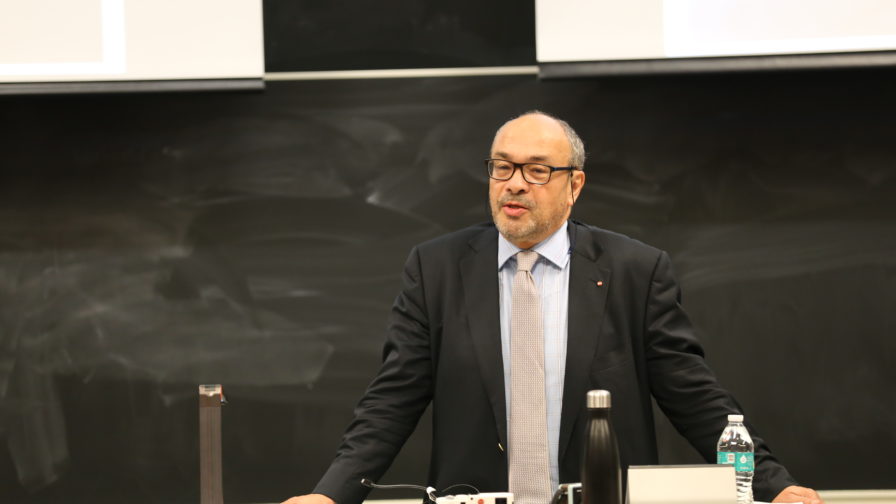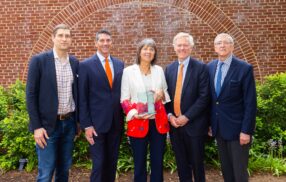
Leica Camera Leader Shares Restructuring Success Story at UVA Darden
By Dave Hendrick
Recent years have not always been kind to the traditional camera and film industries.
The 21st century saw many iconic companies fail to adapt to the rapid onset of high-quality digital photography. The smartphone revolution — with its promise of a perfectly adequate camera in every pocket — took a devastating bite out of the bottom line of many manufacturers
Kodak, a name synonymous with the photography industry, declared bankruptcy in 2012.
While not immune from the turmoil, Leica Camera AG has managed to stay above water and even thrive in recent years.
Dr. Andreas Kaufmann, chairman of the German photography company, recently came to the University of Virginia Darden School of Business as part of a Leadership Speaker Series event to chart what worked, what didn’t and how Leica thinks about the future.
Although the quality of the company’s products and affection they engendered in hobbyists and professionals had never been in question, Kaufmann said Leica was as battered as its peers by the digital revolution by 2004.
Although the company had been working on digital products, its marketing language at the time continued to put film first, and a campaign proudly declared: “I am a film dinosaur.”
“It was an interesting, let’s say, [attempt] to go against everything,” Kaufmann said, adding that the company was essentially bankrupt by 2005.
Leica would go on to more fully embrace digital and embark on a complex restructuring plan, buying out certain key shareholders and repositioning its product line and retail strategy.
Through it all, the company held fast to its area of expertise, Kaufmann said, not losing sight of the fact that the optical experience remained much the same whether in digital or film.
The company also embraced retail as a “key marketing instrument,” opening locally tailored stores across the world and becoming “the only company in the segment with a retail concept,” according to Kaufmann.
At the end of the successful restructuring, Leica had total control of its brand, market and prices, Kaufmann said, and the future was bright enough that Blackstone purchased a 45 percent stake in the company in 2011.
So why did Leica thrive while others failed?
The company started with the built-in advantage of an “iconic brand with loyal customers,” Kaufmann said. They also kept production and quality control close to home — producing cameras in Portugal instead of China — and only struck partnerships when convinced they would not be detrimental to the brand.
The chairman said the company, while global, also attempts to truly understand its local markets.
And while the company has stayed true to its bread-and-butter formula of high-end cameras, lenses and sport optics like binoculars and rifle scopes, it has no intention of being the dinosaur in the smartphone era, taking the “controlled step” of partnering with Huawei for Leica cameras on select high-end smartphones. The two companies recently announced the creation of an innovation lab in Germany where dozens of engineers will work toward developing solutions for smartphone photography.
The partnership does not represent huge income potential for Leica, Kaufmann said, but is an important marketing tool, introducing Leica to a new group of customers and showing that even an “old” company can continue to innovate and learn to play by the new rules.
The University of Virginia Darden School of Business prepares responsible global leaders through unparalleled transformational learning experiences. Darden’s graduate degree programs (MBA, MSBA and Ph.D.) and Executive Education & Lifelong Learning programs offered by the Darden School Foundation set the stage for a lifetime of career advancement and impact. Darden’s top-ranked faculty, renowned for teaching excellence, inspires and shapes modern business leadership worldwide through research, thought leadership and business publishing. Darden has Grounds in Charlottesville, Virginia, and the Washington, D.C., area and a global community that includes 18,000 alumni in 90 countries. Darden was established in 1955 at the University of Virginia, a top public university founded by Thomas Jefferson in 1819 in Charlottesville, Virginia.
Press Contact
Molly Mitchell
Associate Director of Content Marketing and Social Media
Darden School of Business
University of Virginia
MitchellM@darden.virginia.edu





